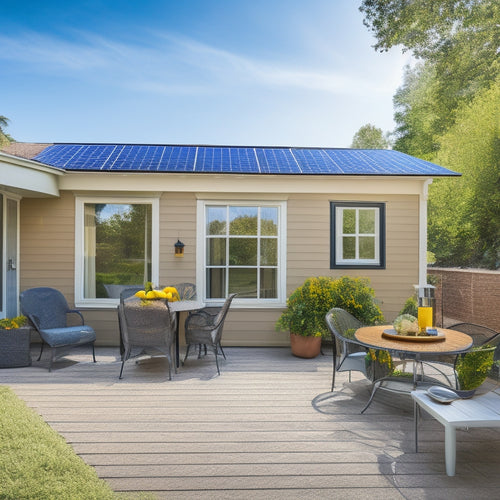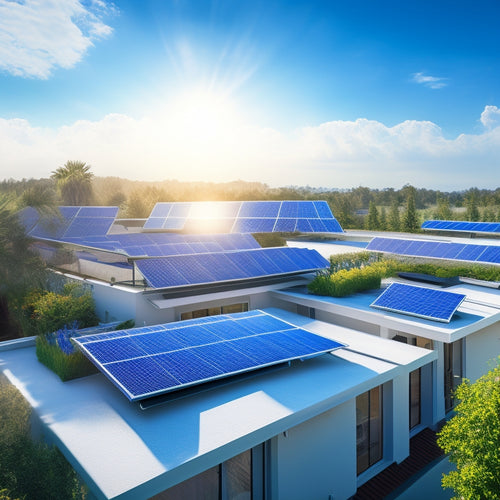
Best Residential Solar Systems for Homeowners
Share
As you investigate the best residential solar systems for your home, consider top-rated brands like SunPower, Panasonic, and LG, which offer high-efficiency solar panels with certifications like UL and IEC. When buying, evaluate factors such as solar panel efficiency, energy storage options, system durability, and warranty terms. Residential solar energy provides cost savings, environmental benefits, and minimal maintenance. To make an informed decision, understand the differences between inverter types, installation and maintenance costs, and review performance metrics from homeowner experiences and industry standards compliance. Now, you're ready to delve deeper and find the perfect system for your energy needs.
Key Takeaways
- Look for top-rated residential solar brands like SunPower, Panasonic, and LG, which offer high-efficiency solar panels and reliable systems.
- Consider factors like solar panel efficiency, energy storage options, system durability, installation process, and monitoring and maintenance capabilities.
- Assess warranties and certifications, such as UL and IEC, to ensure safety and performance standards are met.
- Evaluate inverter types, including string and microinverters, based on system size, performance monitoring, and budget considerations.
- Read residential solar system reviews from credible sources to gain insights into performance metrics, homeowner experiences, and maintenance requirements.
Top Rated Residential Solar Brands
As you begin to investigate the world of residential solar systems, one of the most critical decisions you'll make is choosing a reliable brand that meets your energy needs. Top-rated brands offer high solar panel efficiency, guaranteeing you generate the maximum amount of power from your system.
You'll want to evaluate brands like SunPower, known for their high-efficiency solar panels with up to 22.8% efficiency ratings. Another leader in the industry is Panasonic, offering eco-friendly technology with high-performance solar panels. Other top-rated brands include LG, Trina, and Hanwha Q CELLS, all of which provide reliable and efficient solar systems.
When assessing these brands, look for certifications like UL (Underwriters Laboratories) and IEC (International Electrotechnical Commission), which verify the products meet rigorous safety and performance standards.
Additionally, examine the warranty and customer support offered by each brand, as these can greatly impact your overall satisfaction with your residential solar system. By choosing a reputable brand, you'll be well on your way to utilizing the power of solar energy for your home.
Factors to Consider When Buying
When selecting a residential solar system, you'll need to evaluate several key factors to confirm you're getting the right fit for your energy needs. One essential consideration is solar panel efficiency, which affects how much power your system can generate. Look for panels with high efficiency ratings, typically above 20%, to maximize your energy output.
Another important factor is energy storage options. If you want to store excess energy generated during the day for use at night or during power outages, you'll need a battery storage system. Consider the type and capacity of the battery, as well as its compatibility with your solar panel system.
Additionally, assess the system's durability and warranty, making certain it can withstand environmental conditions and last for years to come.
You should also consider the installation process, including the company's experience and reputation, as well as any necessary permits and inspections.
Finally, evaluate the system's monitoring and maintenance capabilities, making sure you can track its performance and address any issues promptly.
Benefits of Residential Solar Energy
Your decision to invest in a residential solar system will yield numerous benefits that impact your wallet, the environment, and your quality of life. By utilizing the power of the sun, you'll greatly reduce your reliance on the grid, leading to substantial savings on your energy bills. Additionally, you'll increase your energy independence, shielding yourself from unpredictable energy price fluctuations.
Residential solar energy also has a significant environmental impact. By shifting to clean, renewable energy, you'll reduce your carbon footprint, contributing less to greenhouse gas emissions and climate change. This eco-friendly approach won't only benefit the planet but also enhance your reputation as a responsible, environmentally conscious homeowner.
Furthermore, solar energy systems require minimal maintenance, ensuring a hassle-free experience. With a typical lifespan of 25 years or more, your residential solar system will provide a long-term, sustainable solution for your energy needs.
Inverter Types and Their Differences
The heart of any residential solar system lies in its inverter, which converts DC power from the solar panels into AC power for your home. When choosing an inverter, you'll come across two main types: string inverters and microinverters. Each has its advantages and disadvantages, which you should consider when selecting the best inverter for your solar system.
| Inverter Type | Characteristics |
|---|---|
| String Inverters | Connect multiple panels in a string, converting DC power to AC; more cost-effective, but can be affected by shading or panel mismatch |
| Microinverters | Attached to each panel, converting DC power to AC independently; more expensive, but provides panel-level monitoring and optimization |
| String Inverters | Typically used for larger systems, requiring a central inverter; can be noisy and generate heat |
| Microinverters | Suitable for smaller systems, providing more flexibility and design options; offers better performance monitoring and troubleshooting |
When deciding between string inverters and microinverters, consider factors like system size, budget, and monitoring requirements. By understanding the differences between these inverter types, you can make an informed decision to guarantee your residential solar system operates efficiently and effectively.
Installation and Maintenance Costs
Having chosen the right inverter for your residential solar system, you're likely wondering about the upfront and ongoing expenses associated with getting your system up and running, as well as keeping it in prime condition.
The installation process typically accounts for the largest portion of the initial cost. This includes labor, materials, and permits, averaging between $2.50 and $3.50 per watt. For a standard 5-kilowatt system, that's $12,500 to $17,500.
After installation, maintenance costs are relatively low. Most manufacturers recommend inspecting and cleaning your panels every 6 months to guarantee peak performance. You can do this yourself or hire a professional for around $100 to $200 per visit.
You may also need to replace the inverter every 10 to 15 years, which can cost between $1,000 and $3,000. Following these maintenance tips will help you avoid more costly repairs down the line.
Additionally, many solar panel systems come with warranties that cover parts and labor for 10 to 25 years, providing added protection for your investment.
Residential Solar System Reviews
When it comes to selecting the best residential solar system for your home, reading reviews from reputable sources is essential. You want to guarantee that the system you choose is reliable, efficient, and provides significant residential energy savings.
Look for reviews that provide specific details about the system's performance, including solar panel efficiency and overall energy output. Pay attention to reviews from homeowners who've similar energy needs and climate conditions as you. This will give you a better understanding of how the system will perform in your area.
Check if the reviews mention any issues with the system, such as maintenance requirements or technical glitches. A reputable solar system should have a proven track record of reliability and minimal maintenance needs.
Also, check if the reviews mention any certifications or compliance with industry standards. A high-quality residential solar system should meet or exceed industry standards for solar panel efficiency and performance.
Frequently Asked Questions
Can I Install Solar Panels on a Metal Roof?
You're likely aware that 70% of commercial buildings have metal roofs, making them ideal for solar installations. When installing solar panels on your metal roof, you'll benefit from its advantages, such as durability and water resistance, but consider unique installation considerations, like specialized mounting systems and potential noise issues.
Will Solar Panels Increase My Property Value?
You'll be pleased to know that your solar investment can enhance your property value; in fact, a property appraisal will likely reflect the increased worth, as solar panels are viewed as a desirable, modern amenity.
Do Solar Panels Work During Power Outages?
When the grid goes down, you'll still have power if you've invested in solar energy storage, giving you grid independence; however, without a battery backup, your solar panels won't work during power outages, leaving you in the dark.
Can I Sell Excess Energy Back to the Grid?
As you capture the sun's golden rays, you'll be thrilled to know you can sell excess energy back to the grid through net metering benefits and energy buyback programs, offsetting your utility bills and padding your wallet.
Do Solar Panels Require Regular Cleaning?
You'll need to clean your solar panels regularly as part of solar panel maintenance, ideally every 6-12 months, depending on your location and climate, to guarantee maximum energy production and prevent dust buildup that reduces efficiency.
Related Posts
-

10 Tips to Buy Affordable Solar Panels Online
When purchasing affordable solar panels online, you'll want to research reputable retailers, compare prices, and chec...
-

What Are the Average Cost Savings of Solar Panels
You can expect to save between $400 and $1,000 per year on your electricity bills with solar panels, which translates...
-

Best Solar Panel Options for Maximum Energy Savings
You can maximize your energy savings with solar panels that boast efficiency ratings above 20%, paired with extensive...


